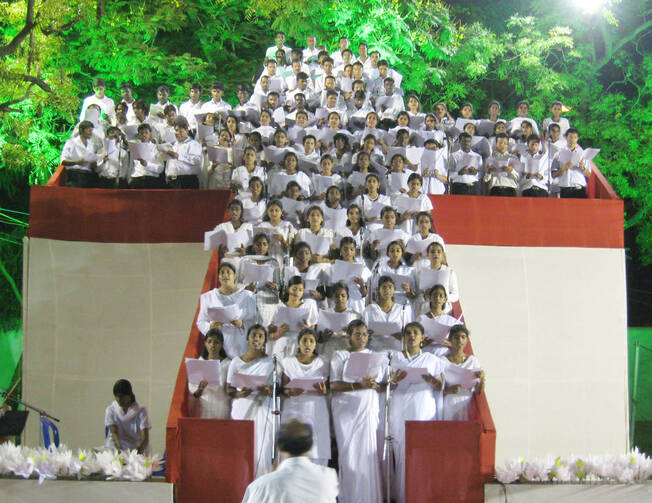Chennai, India — As you may recall, I am on sabbatical this year, and from early January until the end of March, I am traveling in India: doing some writing, visiting familiar places (such as Chennai, where I have lived many times) and Kolkata (Calcutta, where I’ve visited three times before) and new places (such as Sri Lanka, where I will travel later in February), seeing old friends and meeting new and, though much less than in the past, buying a few books. I am always grateful to be invited to give lectures in various colleges and centers, since these presentations, often somewhat informal, give me the opportunity to connect with local scholars and professors, always a valuable experience. It is striking how many “lay people” in cities like Chennai are extraordinarily well-versed in their traditions.
I have stayed thus far at Arul Kadal—the “Ocean of Grace,” in Tamil—the Tamil-language regional theologate for the Jesuits of the Madurai Province, South India. This is where I lived for two years (1982-3, 1992-3) when it was a center for interfaith relations and a kind of Jesuit ashram, Aikiya Alayam—the “Abode of Unity.” Arul Kadal, where young Jesuits spend two years of their theology study, is dedicated to Christian theology and formation in accord with the rich cultural and linguistic traditions of south India, and to ensuring that those preparing for ordination have the opportunity for ministry in their native Tamil language. Part of their training is also done in all-India centers, in Chennai, Pune and Delhi. (Since my spoken Tamil and Tamil comprehension are woeful, it is fortunate that everyone at Arul Kadal is also fluent in English. They were kind and patient enough the other day, however, to invite me to preside at the Eucharist in Tamil, which I dutifully did, though I preached in English.)
Chennai, the fourth largest city of India, is a city rich in culture, educational institutions and traditions of music/dance performance. There is a fine and old Sanskrit College where I gave a presentation on my work last evening. Everywhere in the city are temples, particularly in Mylapore, the oldest part of the city (which predates Madras [Chennai], the British settlement, by many centuries). Though the city is an important center of business and technology, one can learn very much about lived and living Hinduism just by visiting any one of the small or large temples that are everywhere around us. There is also a significant Muslim population, and small but old and deeply rooted Christian communities, which date themselves back to St. Francis Xavier and even to St. Thomas the Apostle who, by tradition, was buried beneath what is now the San Thome cathedral.
The intellectual culture is lively too. The music festival season is recently over, and just this past week, I attended conferences on sacred places and pilgrimage, on comparative religion and ethics in a global world and participated in events at Satya Nilayam (the “Center for Truth”) national house of philosophy studies, the Jesuit Institute for the Dialogue of Cultures and Religions (heir to the old Aikiya Alayam), the Asian Centre for Cross Cultural Studies and the Kuppuswami Shastri Research Institute at Mylapore’s Sanskrit College. There are festivals at both churches and temples, and such events, however crowded and festive, include discourses on religious themes, ancient traditions brought into dialogue with today’s society and its needs.
India faces the same problems of urbanization, population growth, the divide of rich and poor, ecological degradation and secularization as countries elsewhere in the world, plus the stresses and strains of remaining both a robust and enduring democracy and one of the most religiously diverse countries on earth. The many strands of Hinduism too are undergoing the stresses of adaptation to today’s more fluid local and global societies. Resources are stretched terribly thin. Sectarian differences remain, as do (ever-changing) caste structures, even if they are changing swiftly in India’s great cities.
What strikes me, after so many visits to Chennai, is how ordinary, alive and thriving the society and its religious and intellectual strands remain. We often think of “exotic India” and of “exotic Hinduism,” but while there may be dimensions of both that are extraordinary and genuinely different from what we find in the Christian West, it is more apt first of all to respect the fact of “ordinary India” and “ordinary Hinduism,” no more or less exotic and special than the cultures of Brooklyn, New York or Cambridge, Massachusetts. It is important to say this, I think, because we need, less romantically and idealistically than before, to have our feet on the ground when we imagine the future of interreligious dialogue. While on occasion dialogue demands expert learning and delves into deep spiritual and mystical realities, it has most often to do with any and all of our religions finding their way in the cities and global networks of the 21st century. Religions, including Christian and Hindu, are here to stay, are challenged, ever on edge and learning how to survive and adapt. Chennai is a wonderful site for thinking about the great meeting of religions in the present moment.
I am off this morning to speak at a Hindu institute in another part of the city—on the theme of surrender to God—and then tonight, if all goes well, will travel up to Kolkata (Calcutta) for some events there. More in a future posting.







